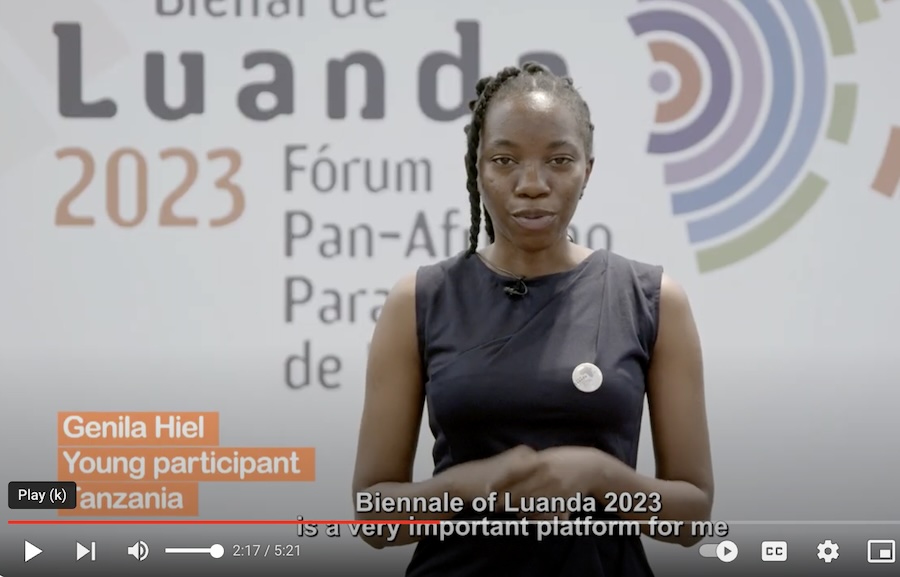FREE FLOW OF INFORMATION
The transcript of the UNESCO Youtube video
(Editor’s note: The 2023 Biennale of Luanda included 790 participants from all of Africa including some young people since the Biennale “advocated the establishment of partnerships between political leaders and young people, in sustainable social and economic projects, which could benefit society as a whole.” In addition to those listed below, three youth were invited from Togo. The previous Biennale in 2021 included 118 young people from 49 African countries and 14 countries of the Diaspora.)
Hello, my name is Mpule. I am from Botswana and I was selected together with eleven other young people from across Africa to participate in the third edition of the Biennale of Luanda. Every two years since 2019. the Biennale brings together heads of state, international organizations, the private sector, artists, academics and young people to boost dialogue and foster collective actions for peace in Africa. The event lasted three days with many discussions between youth and political leaders, thematic forums as well as cultural festivities.

Palmira Cassova from Angola: This third edition of the Biennale of Luanda is of great importance for us, young people, because it was a learning moment and a moment to share experiences with young people from other countries such as Egypt, Botswana, Ghana, Mozambique, We believe that we will remember this for life and we will be able to contribute with what we learned here to peace in Angola and Africa.
(Continued in right column)
(click here for the French version of this article. or here for the Portuguese version )
The Luanda Biennale: What is its contribution to a culture of peace in Africa?
(Continued from left column)
60% of Africans are under 25 and the Biennale placed young Africans at the heart of the discussions. We engaged in dialogue with heads of states and focused on the vital role young Africans play in education, culture, climate change and many more.
Genila Hiel from Tanzania: The Biennale of Luanda 2023 is a very important platform for me because it gave me a chance to have intergenerational dialogue with very good African leaders to be on the same table expressing my ideas on behalf of my fellow youngsters from Africa in general. But the Biennale is above all a great opportunity for us to build networks and strengthen our knowledge for our work back home.
Hello, my name is Hakim, I am 30 years old. I am Algerian. I am also one of the young people selected for the Biennale. I am honoured to be able to develop solutions with our heads of state for African youth. In my opinion, entrepreneurship is key to reducing inequalities and fostering a culture of peace on the continent. We discussed during the Biennale, inclusive growth as a lever for peace, I strongly believe in it because the sustainability of family businesses and support for entrepreneurship can highlight the potential of our youth so that everyone finds their place in our societies. We also discussed the key role of education and higher education. I am the first of eight children to go to university. I became aware of the importance of getting involved in issues like equal opportunities, education and social justice. Education plays a crucial role in shaping free and well-informed African citizens.
Yasmein Abdelghany from Egypt: Education for peace is an education that provides learners with knowledge, skills and competences to be active agents of the change in their community. It aims to learn to teach them about tolerance, about acceptance, about diversity. Education for peace is very important because at the heart of our African aspirations is to build an integrated, peaceful and prosperous Africa and this won’t be achieved without education, without teaching our future generations the values of peace and nonviolence.
Mpule from Botswana: I’ve always been actively engaged in promoting women’s empowerment. Today, my mission is to increase women’s participation in leadership and decision making processes. The Biennale highlighted the role of women in peace, security and development processes. On this occasion, we had the opportunity to stress the crucial link between women’s political participation and peace and security. Young people are crucial as catalysts for building a culture of peace. Our presence was felt and our voices were heard. The spirit of the Biennale of Luanda inspires a new generation of young Africans that paved the way towards a peaceful and prosperous Africa.
Join the Pan-African Movement for a Culture of Peace.
Luanda. Capital of Peace in Africa. Join the movement.